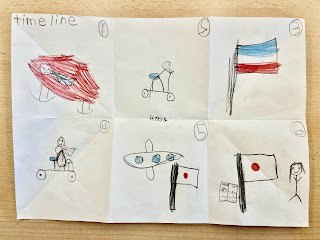Personal History
"The story of who we are and why we are the way we are."
We started unpacking 2 important words that the students need to understand and move on in our inquiry.
It started with making connections....
They noticed that the word 'personal' is in the word 'personality'.
The word 'history' has 'story'
Therefore: Personal History = My Story
This unit will focus on their personal stories from past to present.
Inquiring about growth, changes, journeys and interconnectedness of an individual to the global perspective.
To start of, they listed down things that they know or remember about themselves from 1 to 5/6 year old. They told stories based on their memories or from what they heard or seen from their photos or videos.
In the mind of these fives or sixes, these may be a reality, a vague memory from the past, or simply just an imagination.
Whatever it was, it was great!
What is important is to encourage and develop these young explorers to create a picture of the different people they encounter, experiences or milestones that they will use when they make their stories, or, personal history.
A Timeline
Important events.
Time from the past to present.
We can go forward or go back.
It is interesting to learn more about everyone's adventures and be able to relate, and connect to others.
That is why 'NOW' is important.
For we can start writing our HIStory or HERstory - in preschool.











Comments
Post a Comment